Charles E W Bean, Diaries, AWM38 3DRL 606/237/1 - October 1914 - 1918 - Part 6
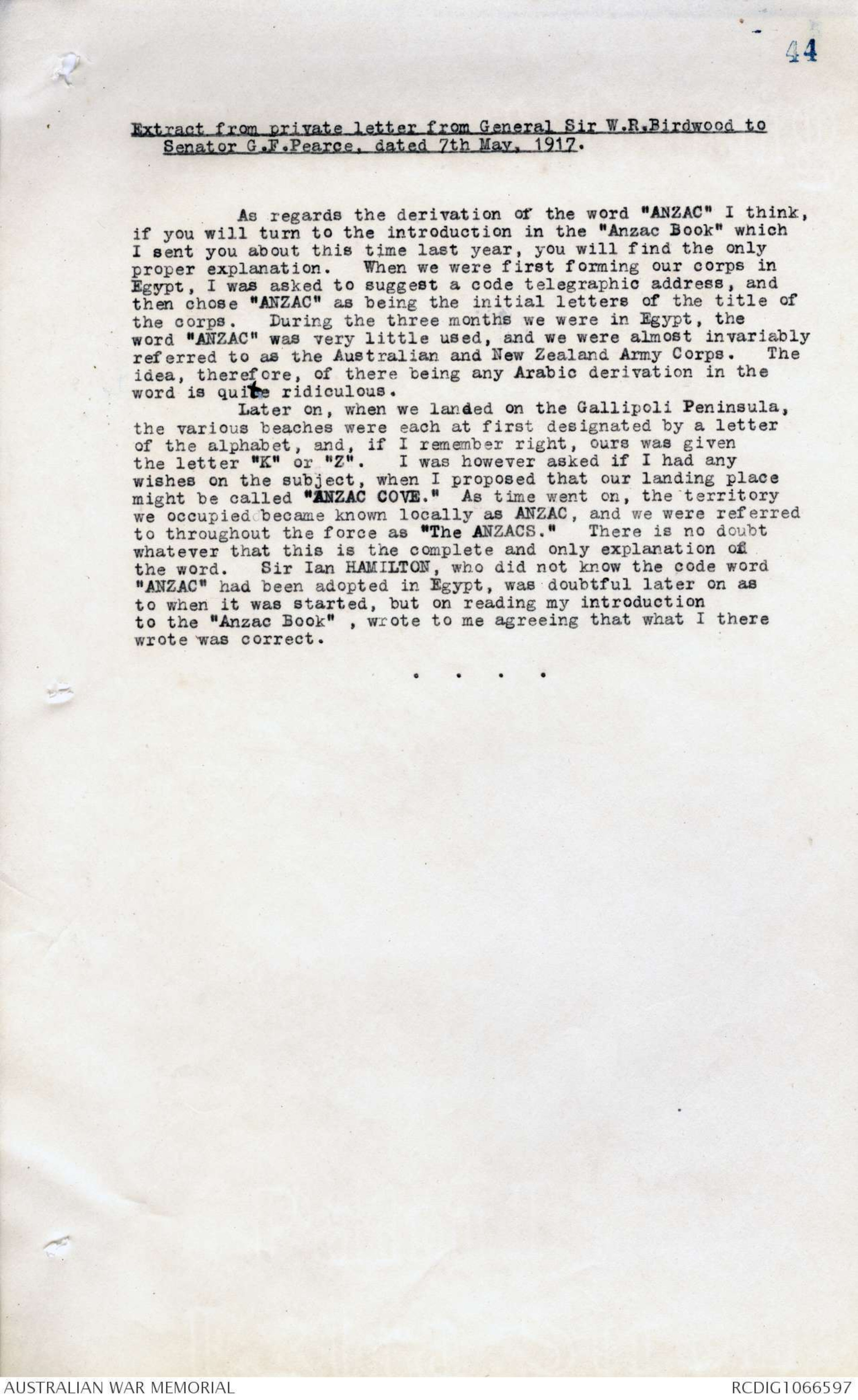
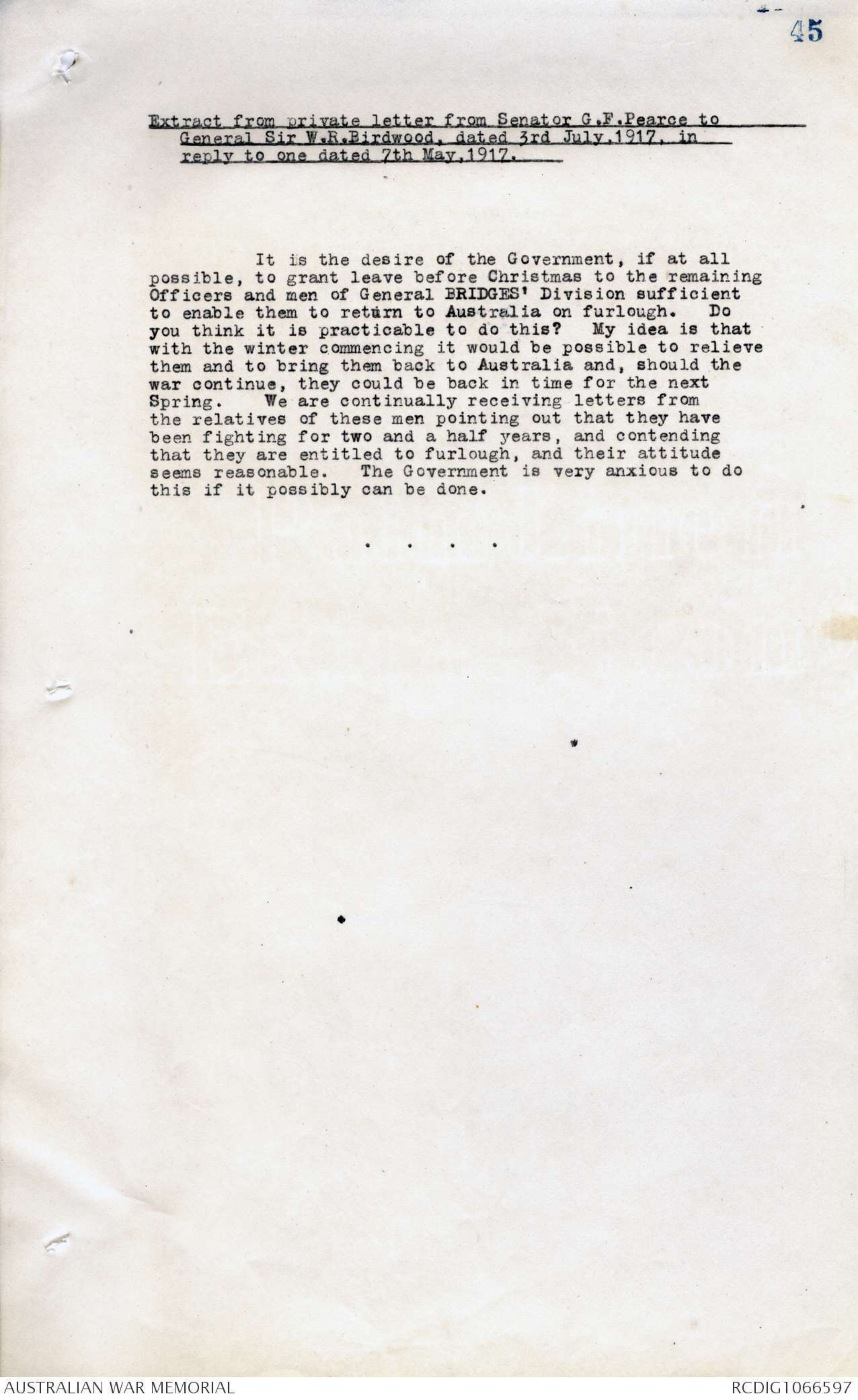
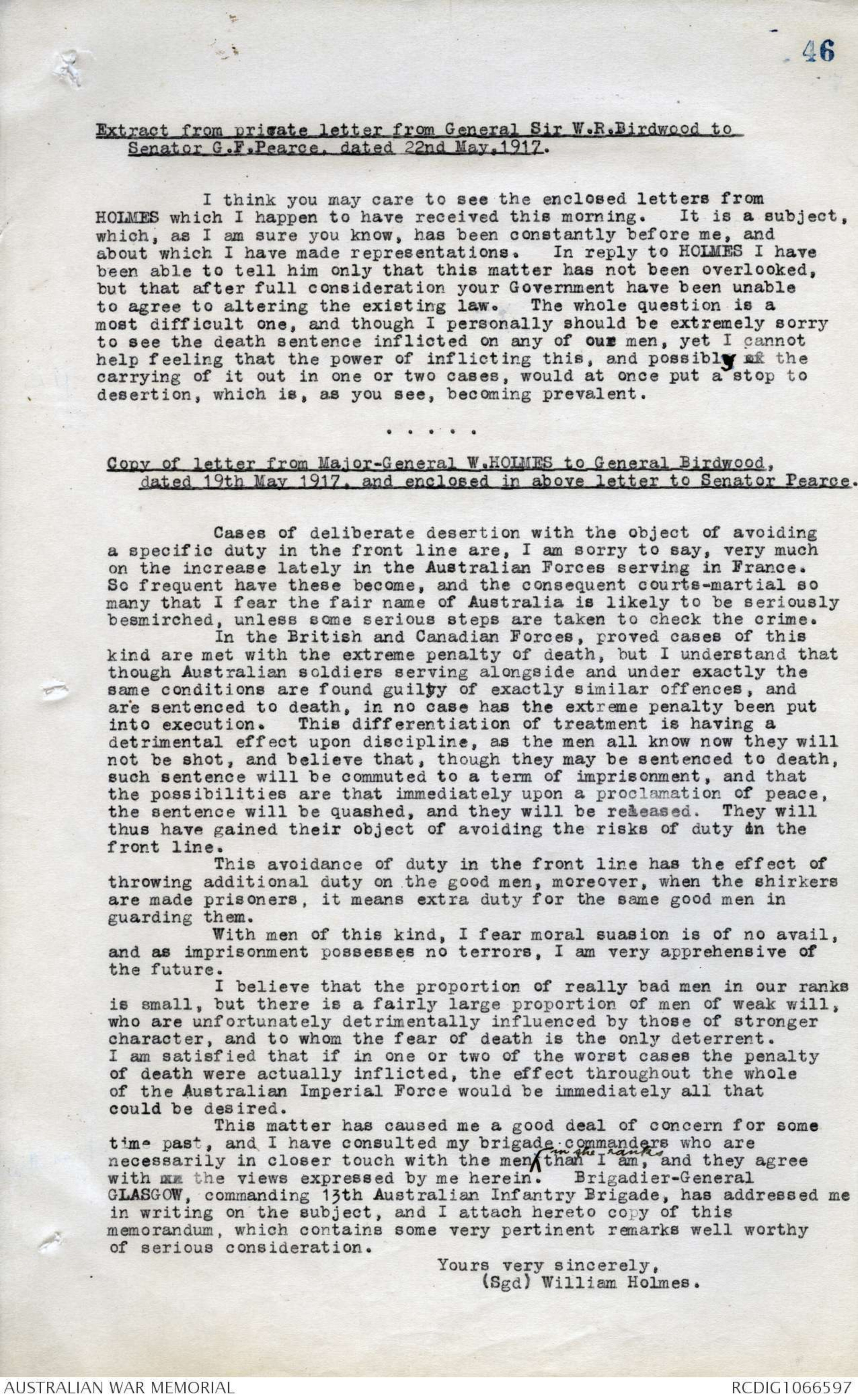
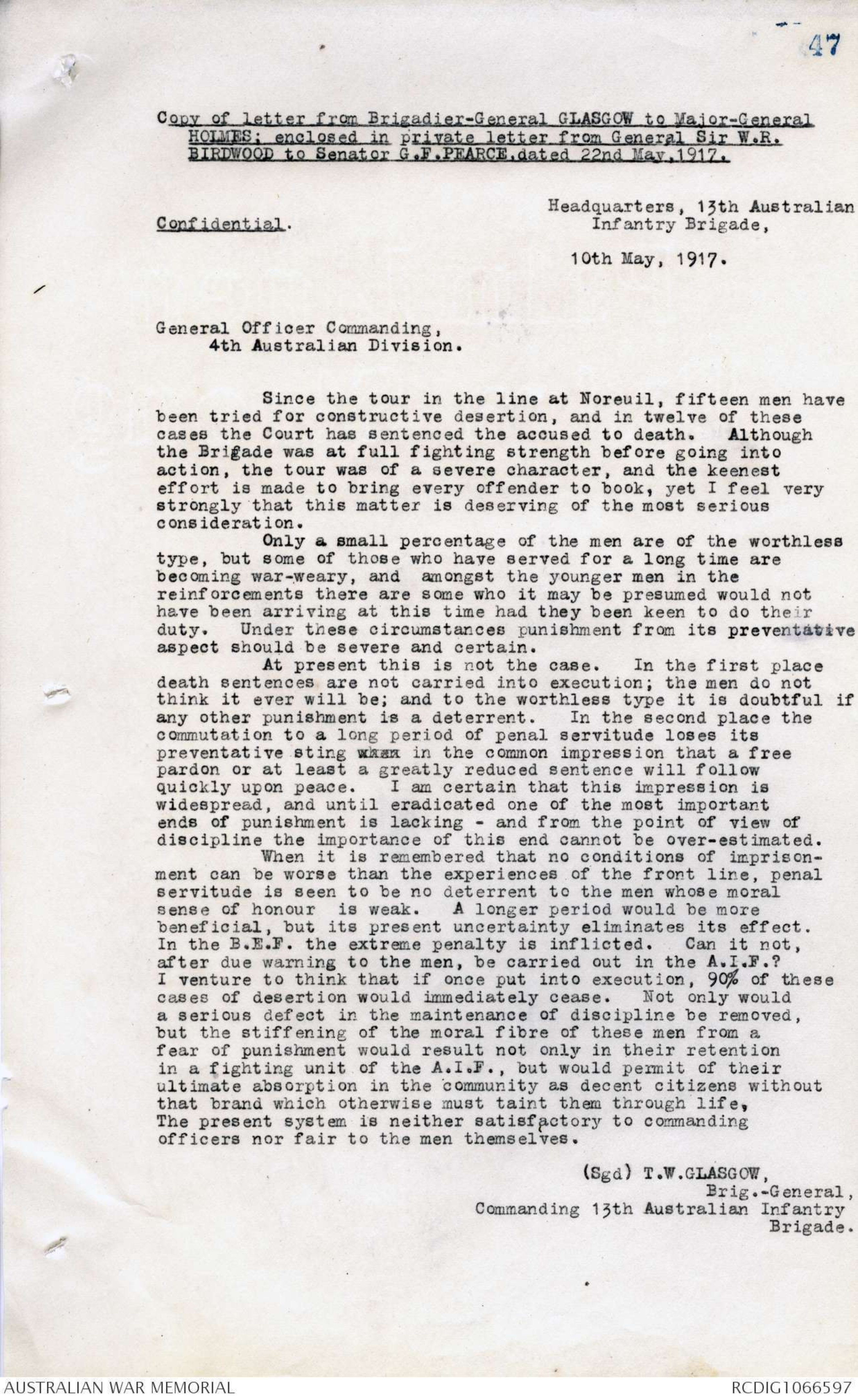
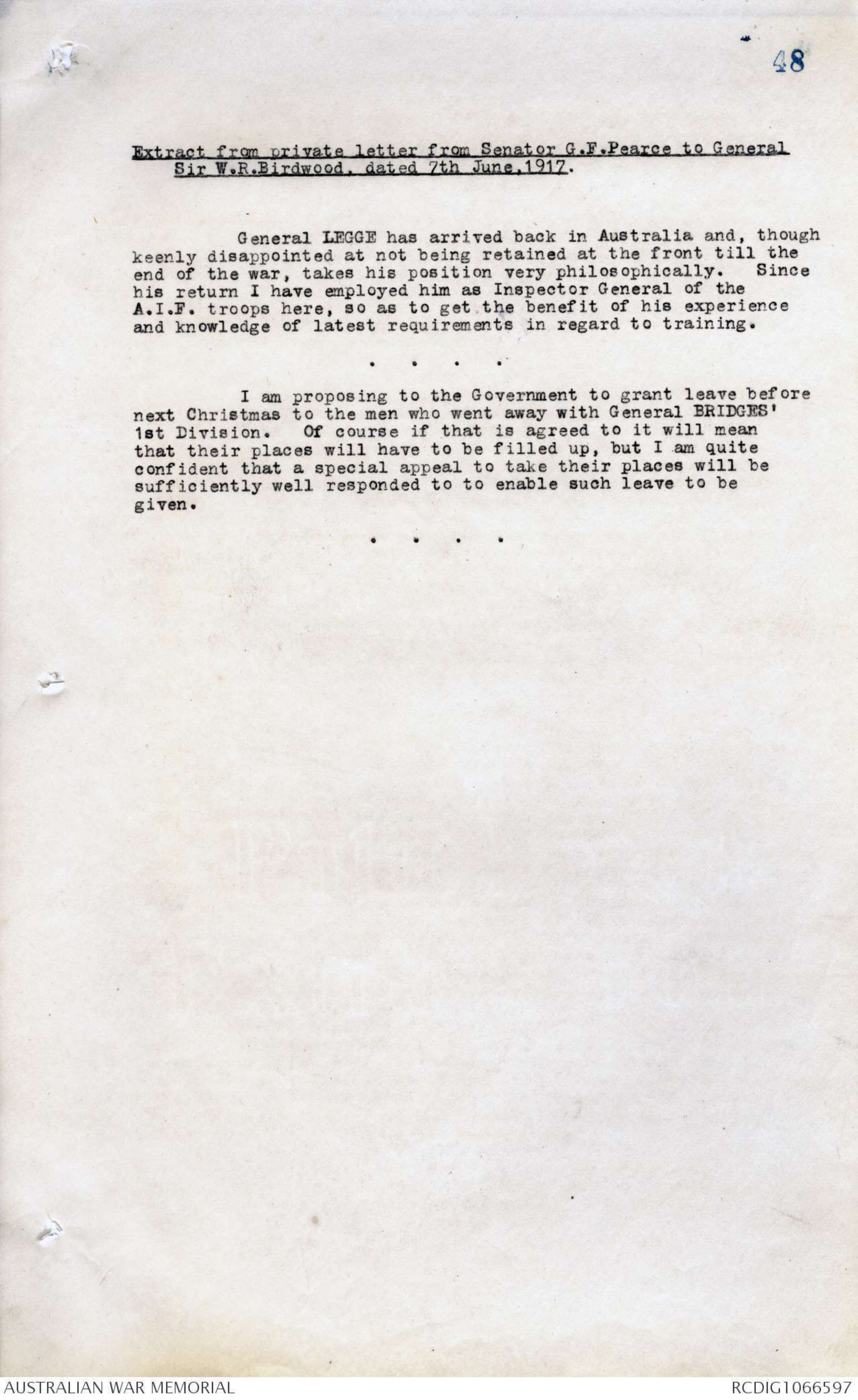
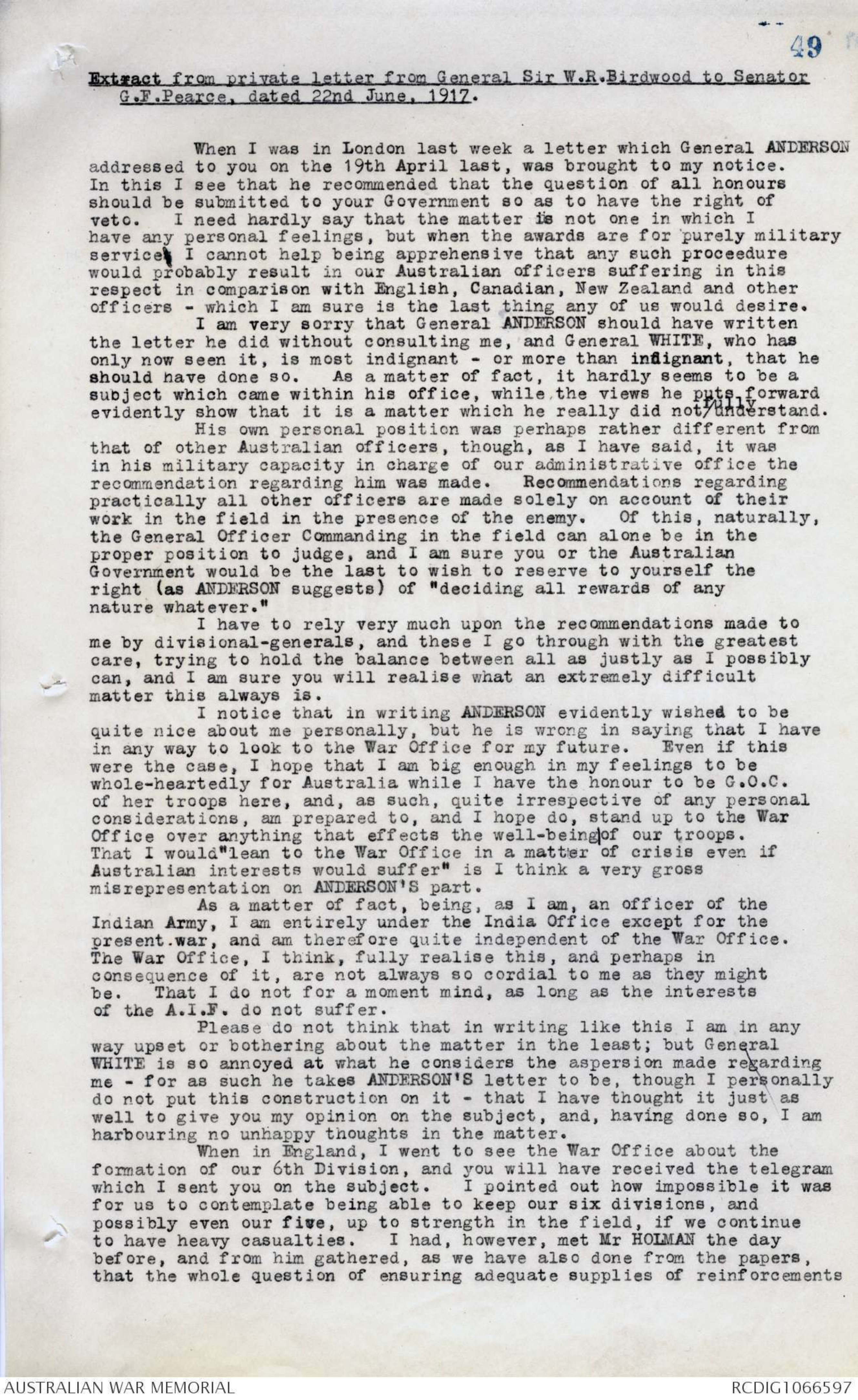
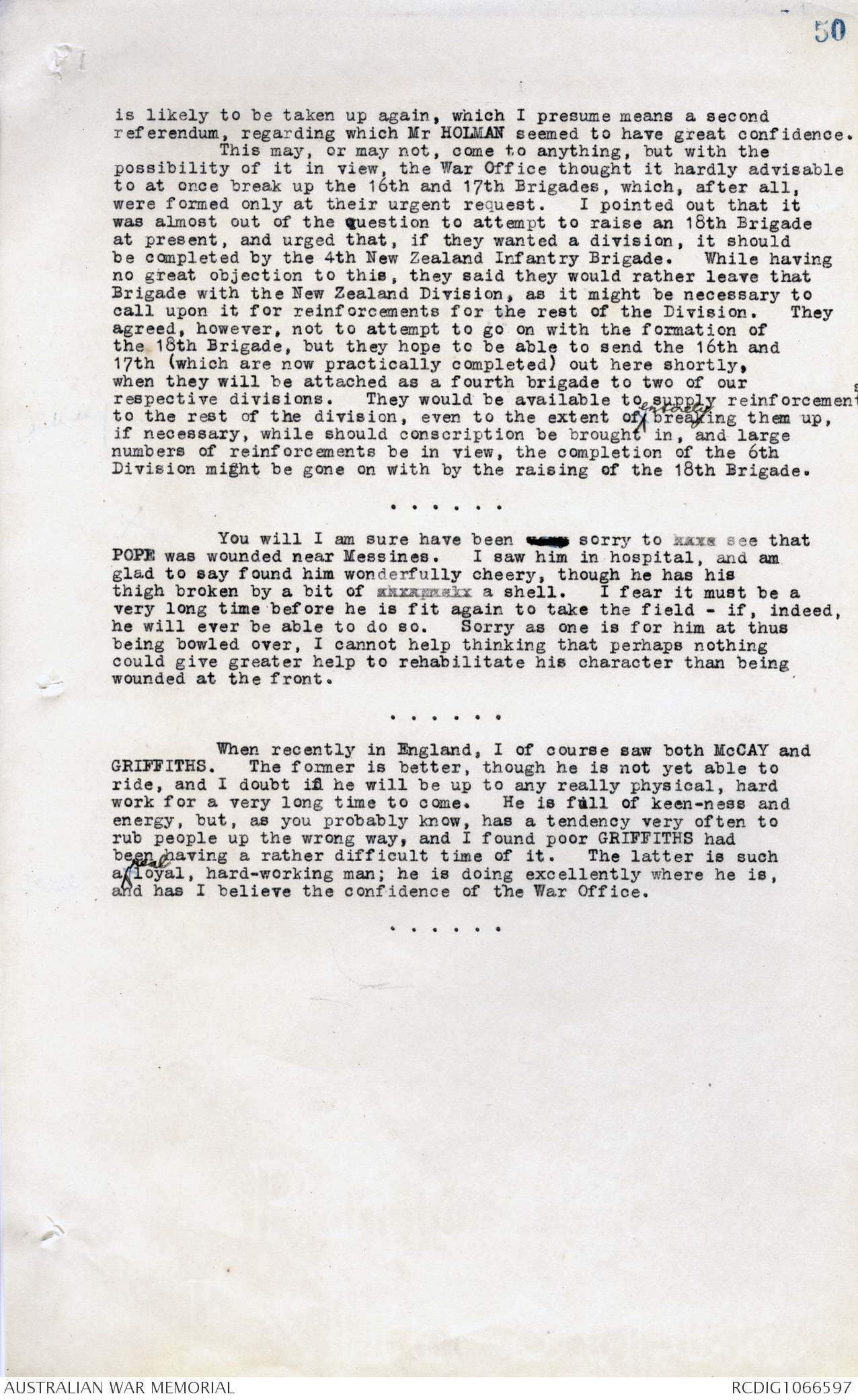
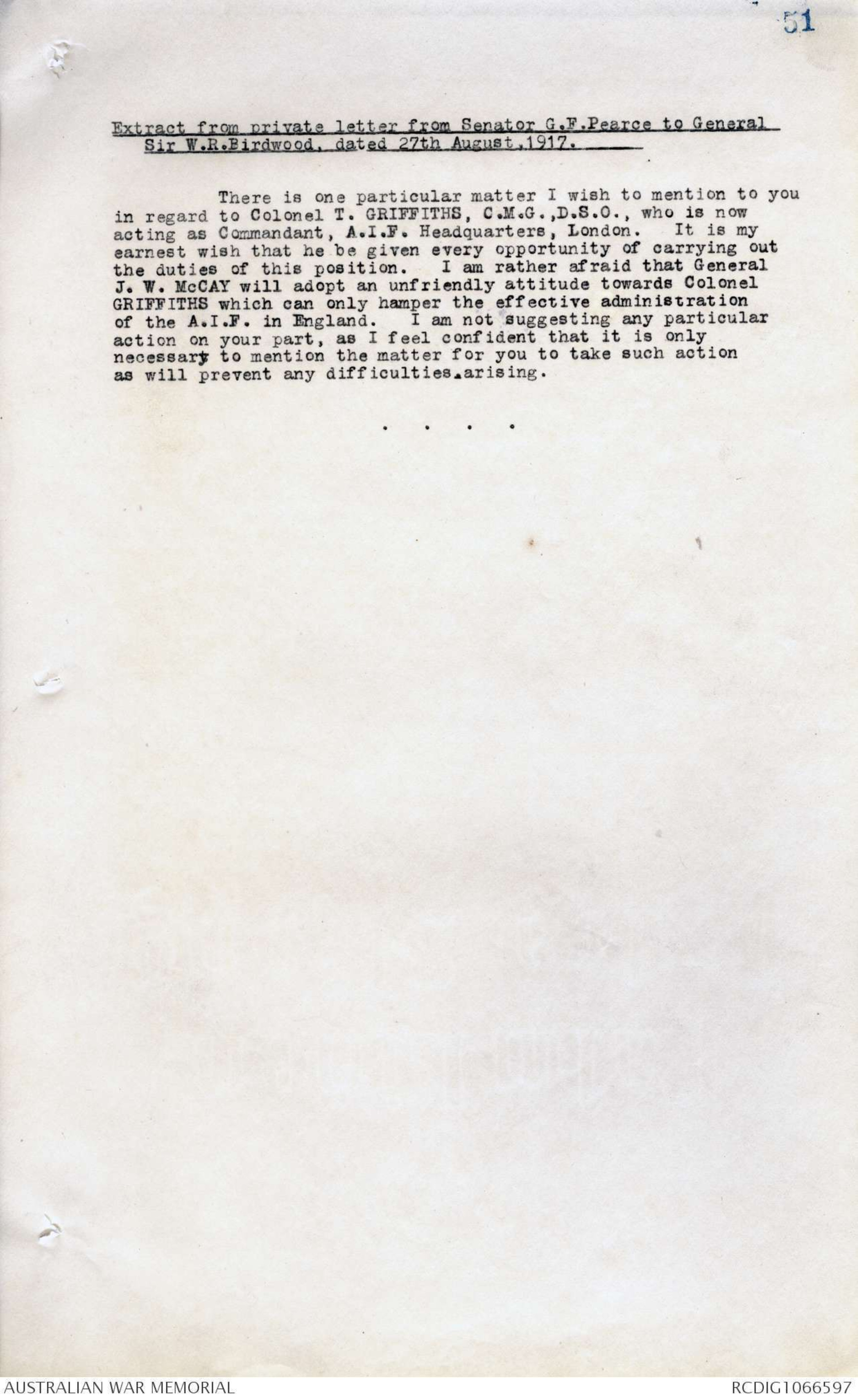
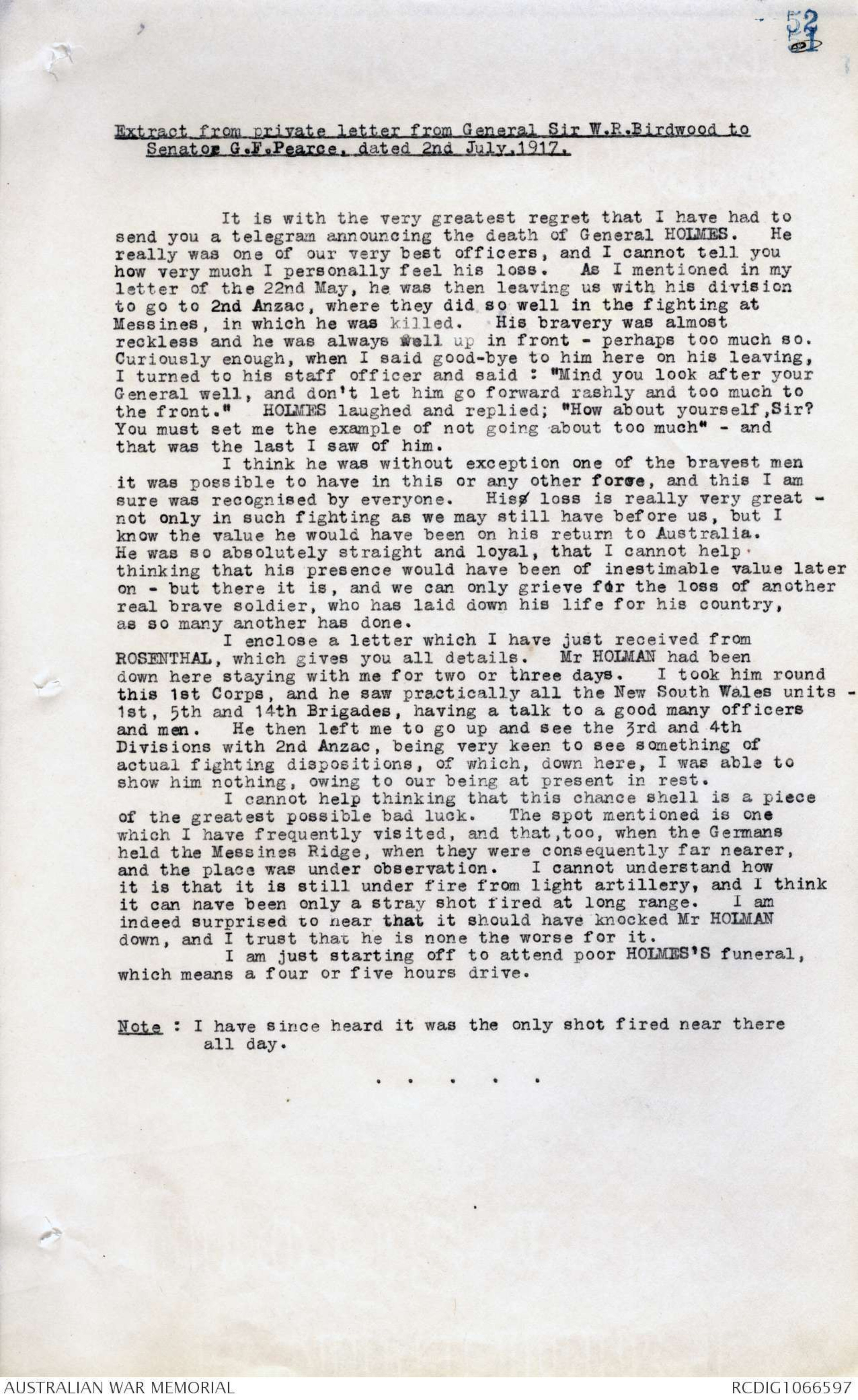
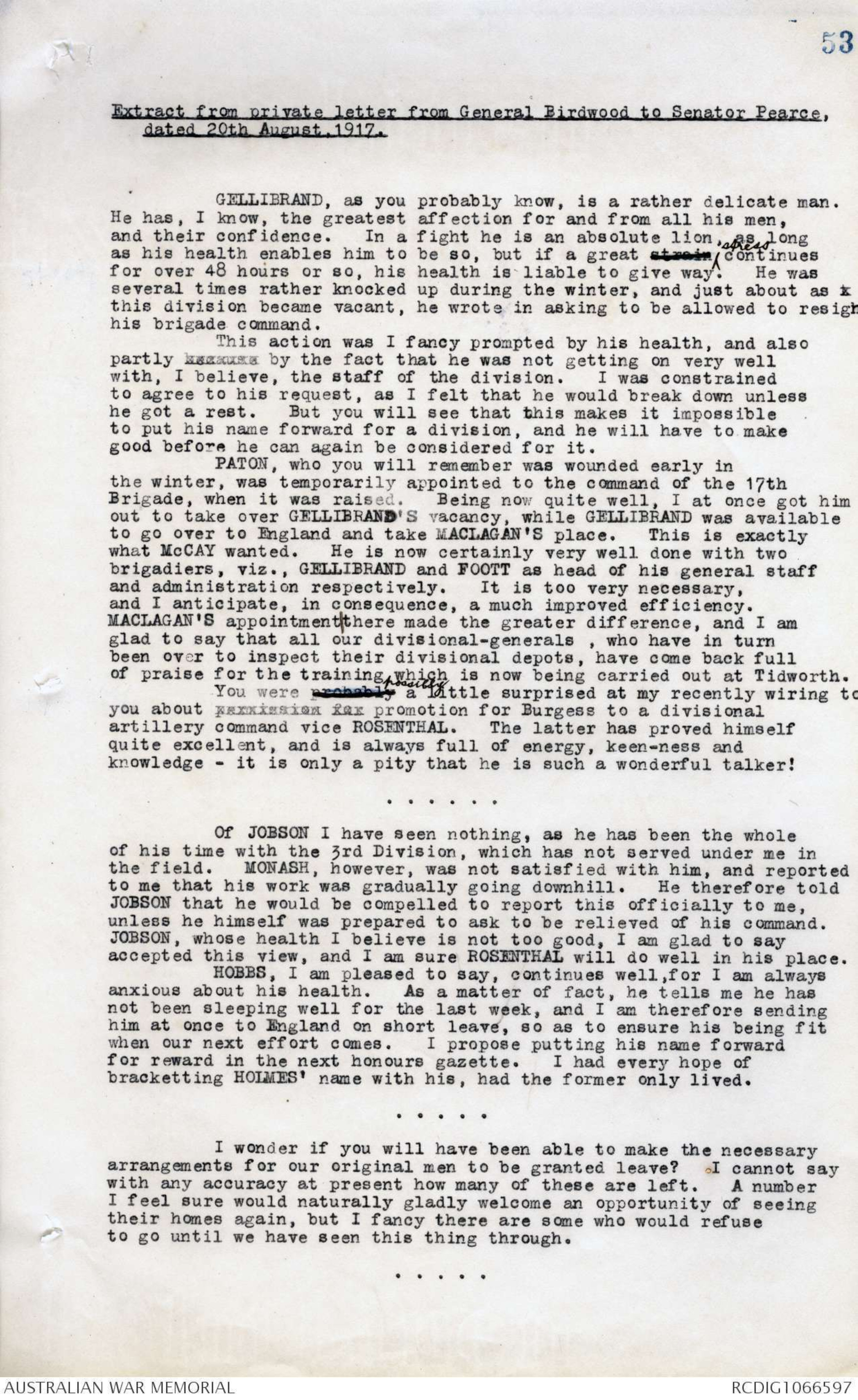
44
Extract from private letter from General Sir W. R. Birdwood to
Senator G. F. Pearce, dated 7th May 1917.
As regards the derivation of the word "ANZAC" I think,
if you will turn to the introduction in the "Anzac Book" which
I sent you about this time last year, you will find the only
proper explanation. When we were first forming our corps in
Egypt, I was asked to suggest a code telegraphic address, and
then chose "ANZAC" as being the initial letters of the title of
the corps. During the three months we were in Egypt, the
word "ANZAC" was very little used, and we were almost invariably
referred to as the Australian and New Zealand Army Corps. The
idea, therefore, of there being any Arabic derivation in the
word is quite ridiculous.
Later on, when we landed on the Gallipoli Peninsula,
the various beaches were each at first designated by a letter
of the alphabet, and, if I remember right, ours was given
the letter "K" or "Z”. I was however asked if I had any
wishes on the subject, when I proposed that our landing place
might be called "ANZAC COVE." As time went on, the territory
we occupied became known locally as ANZAC, and we were referred
to throughout the force as "The ANZACS." There is no doubt
whatever that this is the complete and only explanation of
the word. Sir lan HAMILTON, who did not know the code word
"ANZAC" had been adopted in Egypt, was doubtful later on as
to when it was started, but on reading my introduction
to the "Anzac Book", wrote to me agreeing that what I there
wrote was correct.
45
Extract from private letter from Senator G. F. Pearce to
General Sir W. R. Birdwood, dated 3rd July, 1917, in
reply to one dated 7th May.1917.
It is the desire of the Government, if at all
possible, to grant leave before Christmas to the remaining
Officers and men of General BRIDGES' Division sufficient
to enable them to return to Australia on furlough. Do
you think it is practicable to do this? My idea is that
with the winter commencing it would be possible to relieve
them and to bring them back to Australia and, should the
war continue, they could be back in time for the next
Spring. We are continually receiving letters from
the relatives of these men pointing out that they have
been fighting for two and a half years, and contending
that they are entitled to furlough, and their attitude
seems reasonable. The Government is very anxious to do
this if it possibly can be done.
46
Extract from private letter from General Sir W. R. Birdwood to
Senator G. F. Pearce, dated 22nd May,1917.
I think you may care to see the enclosed letters from
HOLMES which I happen to have received this morning. It is a subject,
which, as I am sure you know, has been constantly before me, and
about which I have made representations. In reply to HOLMES I have
been able to tell him only that this matter has not been overlooked,
but that after full consideration your Government have been unable
to agree to altering the existing law. The whole question is a
most difficult one, and though I personally should be extremely sorry
to see the death sentence inflicted on any of our men, yet I cannot
help feeling that the power of inflicting this, and possibly of the
carrying of it out in one or two cases, would at once put a stop to
desertion, which is, as you see, becoming prevalent.
Copy of letter from Major-General W. HOLMES to General Birdwood,
dated 19th May 1917, and enclosed in above letter to Senator Pearce.
Cases of deliberate desertion with the object of avoiding
a specific duty in the front line are, I am sorry to say, very much
on the increase lately in the Australian Forces serving in France.
So frequent have these become, and the consequent courts-martial so
many that I fear the fair name of Australia is likely to be seriously
besmirched, unless some serious steps are taken to check the crime.
In the British and Canadian Forces, proved cases of this
kind are met with the extreme penalty of death, but I understand that
though Australian soldiers serving alongside and under exactly the
same conditions are found guilty of exactly similar offences, and
are sentenced to death, in no case has the extreme penalty been put
into execution. This differentiation of treatment is having a
detrimental effect upon discipline, as the men all know now they will
not be shot, and believe that, though they may be sentenced to death,
such sentence will be commuted to a term of imprisonment, and that
the possibilities are that immediately upon a proclamation of peace,
the sentence will be quashed, and they will be released. They will
thus have gained their object of avoiding the risks of duty in the
front line.
This avoidance of duty in the front line has the effect of
throwing additional duty on the good men, moreover, when the shirkers
are made prisoners, it means extra duty for the same good men in
guarding them.
With men of this kind, I fear moral suasion is of no avail,
and as imprisonment possesses no terrors, I am very apprehensive of
the future.
I believe that the proportion of really bad men in our ranks
is small, but there is a fairly large proportion of men of weak will,
who are unfortunately detrimentally influenced by those of stronger
character, and to whom the fear of death is the only deterrent.
I am satisfied that if in one or two of the worst cases the penalty
of death were actually inflicted, the effect throughout the whole
of the Australian Imperial Force would be immediately all that
could be desired.
This matter has caused me a good deal of concern for some
time past, and I have consulted my brigade commanders who are
necessarily in closer touch with the men ^in the ranks than I am, and they agree
with me the views expressed by me herein. Brigadier-General
GLASGOW, commanding 13th Australian Infantry Brigade, has addressed me
in writing on the subject, and I attach hereto copy of this
memorandum, which contains some very pertinent remarks well worthy
of serious consideration.
Yours very sincerely,
(Sgd) William Holmes.
47
Copy of letter from Brigadier-General GLASGOW to Major-General
HOLMES; enclosed in private letter from General Sir W. R.
BIRDWOOD to Senator G. F. PEARCE. dated 22nd May, 1917.
Headquarters, 13th Australian
Infantry Brigade,
Confidential.
10th May, 1917.
General Officer Commanding,
4th Australian Division.
Since the tour in the line at Noreuil, fifteen men have
been tried for constructive desertion, and in twelve of these
cases the Court has sentenced the accused to death. Although
the Brigade was at full fighting strength before going into
action, the tour was of a severe character, and the keenest
effort is made to bring every offender to book, yet I feel very
strongly that this matter is deserving of the most serious
consideration.
Only a small percentage of the men are of the worthless
type, but some of those who have served for a long time are
becoming war-weary, and amongst the younger men in the
reinforcements there are some who it may be presumed would not
have been arriving at this time had they been keen to do their
duty. Under these circumstances punishment from its preventative
aspect should be severe and certain.
At present this is not the case. In the first place
death sentences are not carried into execution; the men do not
think it ever will be; and to the worthless type it is doubtful if
any other punishment is a deterrent. In the second place the
commutation to a long period of penal servitude loses its
preventative sting when in the common impression that a free
pardon or at least a greatly reduced sentence will follow
quickly upon peace. I am certain that this impression is
widespread, and until eradicated one of the most important
ends of punishment is lacking - and from the point of view of
discipline the importance of this end cannot be over-estimated.
When it is remembered that no conditions of imprisonment
can be worse than the experiences of the front line, penal
servitude is seen to be no deterrent to the men whose moral
sense of honour is weak. A longer period would be more
beneficial, but its present uncertainty eliminates its effect.
In the B.E.F. the extreme penalty is inflicted. Can it not,
after due warning to the men, be carried out in the A.I.F.?
I venture to think that if once put into execution, 90% of these
cases of desertion would immediately cease. Not only would
a serious defect in the maintenance of discipline be removed,
but the stiffening of the moral fibre of these men from a
fear of punishment would result not only in their retention
in a fighting unit of the A.I.F., but would permit of their
ultimate absorption in the community as decent citizens without
that brand which otherwise must taint them through life,
The present system is neither satisfactory to commanding
officers nor fair to the men themselves.
(Sgd) T. W. GLASGOW,
Brig.-General,
Commanding 13th Australian Infantry
Brigade.
48
Extract from private letter from Senator G. F. Pearce to General
Sir W. R. Birdwood, dated 7th June, 1917.
General LEGGE has arrived back in Australia and, though
keenly disappointed at not being retained at the front till the
end of the war, takes his position very philosophically. Since
his return I have employed him as Inspector General of the
A.I.F. troops here, so as to get the benefit of his experience
and knowledge of latest requirements in regard to training.
I am proposing to the Government to grant leave before
next Christmas to the men who went away with General BRIDGES'
1st Division. Of course if that is agreed to it will mean
that their places will have to be filled up, but I am quite
confident that a special appeal to take their places will be
sufficiently well responded to to enable such leave to be
given.
49
Extract from private letter from General Sir W. R. Birdwood to Senator
G. F. Pearce, dated 22nd June, 1917.
When I was in London last week a letter which General ANDERSON
addressed to you on the 19th April last, was brought to my notice.
In this I see that he recommended that the question of all honours
should be submitted to your Government so as to have the right of
veto. I need hardly say that the matter is not one in which I
have any personal feelings, but when the awards are for purely military
services I cannot help being apprehensive that any such proceedure
would probably result in our Australian officers suffering in this
respect in comparison with English, Canadian, New Zealand and other
officers - which I am sure is the last thing any of us would desire.
I am very sorry that General ANDERSON should have written
the letter he did without consulting me, and General WHITE, who has
only now seen it, is most indignant - or more than indignant, that he
should have done so. As a matter of fact, it hardly seems to be a
subject which came within his office, while the views he puts forward
evidently show that it is a matter which he really did not ^fully understand.
His own personal position was perhaps rather different from
that of other Australian officers, though, as I have said, it was
in his military capacity in charge of our administrative office the
recommendation regarding him was made. Recommendations regarding
practically all other officers are made solely on account of their
work in the field in the presence of the enemy. Of this, naturally,
the General Officer Commanding in the field can alone be in the
proper position to judge, and I am sure you or the Australian
Government would be the last to wish to reserve to yourself the
right (as ANDERSON suggests) of "deciding all rewards of any
nature whatever."
I have to rely very much upon the recommendations made to
me by divisional-generals, and these I go through with the greatest
care, trying to hold the balance between all as justly as I possibly
can, and I am sure you will realise what an extremely difficult
matter this always is.
I notice that in writing ANDERSON evidently wished to be
quite nice about me personally, but he is wrong in saying that I have
in any way to look to the War Office for my future. Even if this
were the case, I hope that I am big enough in my feelings to be
whole-heartedly for Australia while I have the honour to be G.O.C.
of her troops here, and, as such, quite irrespective of any personal
considerations, am prepared to, and I hope do, stand up to the War
Office over anything that effects the well-being/of our troops.
That I would "lean to the War Office in a matter of crisis even if
Australian interests would suffer" is I think a very gross
misrepresentation on ANDERSON'S part.
As a matter of fact, being, as I am, an officer of the
Indian Army, I am entirely under the India Office except for the
present war, and am therefore quite independent of the War Office.
The War Office, I think, fully realise this, and perhaps in
consequence of it, are not always so cordial to me as they might
be. That I do not for a moment mind, as long as the interests
of the A.I.F. do not suffer.
Please do not think that in writing like this I am in any
way upset or bothering about the matter in the least; but General
WHITE is so annoyed at what he considers the aspersion made regarding
me - for as such he takes ANDERSON'S letter to be, though I personally
do not put this construction on it - that I have thought it just as
well to give you my opinion on the subject, and, having done so, I am
harbouring no unhappy thoughts in the matter.
When in England, I went to see the War Office about the
formation of our 6th Division, and you will have received the telegram
which I sent you on the subject. I pointed out how impossible it was
for us to contemplate being able to keep our six divisions, and
possibly even our five, up to strength in the field, if we continue
to have heavy casualties. I had, however, met Mr HOLMAN the day
before, and from him gathered, as we have also done from the papers,
that the whole question of ensuring adequate supplies of reinforcements
50
is likely to be taken up again, which I presume means a second
referendum, regarding which Mr HOLMAN seemed to have great confidence.
This may, or may not, come to anything, but with the
possibility of it in view, the War Office thought it hardly advisable
to at once break up the 16th and 17th Brigades, which, after all,
were formed only at their urgent request. I pointed out that it
was almost out of the question to attempt to raise an 18th Brigade
at present, and urged that, if they wanted a division, it should
be completed by the 4th New Zealand Infantry Brigade. While having
no great objection to this, they said they would rather leave that
Brigade with the New Zealand Division, as it might be necessary to
call upon it for reinforcements for the rest of the Division. They
agreed, however, not to attempt to go on with the formation of
the 18th Brigade, but they hope to be able to send the 16th and
17th (which are now practically completed) out here shortly,
when they will be attached as a fourth brigade to two of our
respective divisions. They would be available to supply reinforcements
to the rest of the division, even to the extent of ^entirely breaking them up,
if necessary, while should conscription be brought in, and large
numbers of reinforcements be in view, the completion of the 6th
Division might be gone on with by the raising of the 18th Brigade.
You will I am sure have been very sorry to have see that
POPE was wounded near Messines. I saw him in hospital, and am
glad to say found him wonderfully cheery, though he has his
thigh broken by a bit of shrapnel a shell. I fear it must be a
very long time before he is fit again to take the field - if, indeed,
he will ever be able to do so. Sorry as one is for him at thus
being bowled over, I cannot help thinking that perhaps nothing
could give greater help to rehabilitate his character than being
wounded at the front.
When recently in England, I of course saw both McCAY and
GRIFFITHS. The former is better, though he is not yet able to
ride, and I doubt if he will be up to any really physical, hard
work for a very long time to come. He is full of keen-ness and
energy, but, as you probably know, has a tendency very often to
rub people up the wrong way, and I found poor GRIFFITHS had
been having a rather difficult time of it. The latter is such
a ^real loyal, hard-working man; he is doing excellently where he is,
and has I believe the confidence of the War Office.
51
Extract from private letter from Senator G. F. Pearce to General
Sir W. R. Birdwood, dated 27th August, 1917.
There is one particular matter I wish to mention to you
in regard to Colonel T. GRIFFITHS, C.M.G.,D.S.O., who is now
acting as Commandant, A.I.F. Headquarters, London. It is my
earnest wish that he be given every opportunity of carrying out
the duties of this position. I am rather afraid that General
J. W. McCAY will adopt an unfriendly attitude towards Colonel
GRIFFITHS which can only hamper the effective administration
of the A.I.F. in England. I am not suggesting any particular
action on your part, as I feel confident that it is only
necessary to mention the matter for you to take such action
as will prevent any difficulties arising.
52 51
Extract from private letter from General Sir W. R. Birdwood to
Senator G. F. Pearce, dated 2nd July, 1917.
It is with the very greatest regret that I have had to
send you a telegram announcing the death of General HOLMES. He
really was one of our very best officers, and I cannot tell you
how very much I personally feel his loss. As I mentioned in my
letter of the 22nd May, he was then leaving us with his division
to go to 2nd Anzac, where they did so well in the fighting at
Messines, in which he was killed. His bravery was almost
reckless and he was always well up in front - perhaps too much so.
Curiously enough, when I said good-bye to him here on his leaving,
I turned to his staff officer and said : "Mind you look after your
General well, and don't let him go forward rashly and too much to
the front." HOLMES laughed and replied; "How about yourself, Sir?
You must set me the example of not going about too much" - and
that was the last I saw of him.
I think he was without exception one of the bravest men
it was possible to have in this or any other force, and this I am
sure was recognised by everyone. Hiss loss is really very great -
not only in such fighting as we may still have before us, but I
know the value he would have been on his return to Australia.
He was so absolutely straight and loyal, that I cannot help
thinking that his presence would have been of inestimable value later
on - but there it is, and we can only grieve for the loss of another
real brave soldier, who has laid down his life for his country,
as so many another has done.
I enclose a letter which I have just received from
ROSENTHAL, which gives you all details. Mr HOLMAN had been
down here staying with me for two or three days. I took him round
this 1st Corps, and he saw practically all the New South Wales units -
1st, 5th and 14th Brigades, having a talk to a good many officers
and men. He then left me to go up and see the 3rd and 4th
Divisions with 2nd Anzac, being very keen to see something of
actual fighting dispositions, of which, down here, I was able to
show him nothing, owing to our being at present in rest.
I cannot help thinking that this chance shell is a piece
of the greatest possible bad luck. The spot mentioned is one
which I have frequently visited, and that, too, when the Germans
held the Messines Ridge, when they were consequently far nearer,
and the place was under observation. I cannot understand how
it is that it is still under fire from light artillery, and I think
it can have been only a stray shot fired at long range. I am
indeed surprised to hear that it should have knocked Mr HOLMAN
down, and I trust that he is none the worse for it.
I am just starting off to attend poor HOLMES'S funeral,
which means a four or five hours drive.
Note : I have since heard it was the only shot fired near there
all day.
53
Extract from private letter from General Birdwood to Senator Pearce,
dated 20th August, 1917.
GELLIBRAND, as you probably know, is a rather delicate man.
He has, I know, the greatest affection for and from all his men,
and their confidence. In a fight he is an absolute lion, as long
as his health enables him to be so, but if a great strain ^stress continues
for over 48 hours or so, his health is liable to give way. He was
several times rather knocked up during the winter, and just about as x
this division became vacant, he wrote in asking to be allowed to resign
his brigade command.
This action was I fancy prompted by his health, and also
partly because by the fact that he was not getting on very well
with, I believe, the staff of the division. I was constrained
to agree to his request, as I felt that he would break down unless
he got a rest. But you will see that this makes it impossible
to put his name forward for a division, and he will have to make
good before he can again be considered for it.
PATON, who you will remember was wounded early in
the winter, was temporarily appointed to the command of the 17th
Brigade, when it was raised. Being now quite well, I at once got him
out to take over GELLIBRAND'S vacancy, while GELLIBRAND was available
to go over to England and take MACLAGAN'S place. This is exactly
what McCAY wanted. He is now certainly very well done with two
brigadiers, viz., GELLIBRAND and FOOTT as head of his general staff
and administration respectively. It is too very necessary,
and I anticipate, in consequence, a much improved efficiency.
MACLAGAN'S appointment/there made the greater difference, and I am
glad to say that all our divisional-generals, who have in turn
been over to inspect their divisional depots, have come back full
of praise for the training which is now being carried out at Tidworth.
You were probably possibly a little surprised at my recently wiring to
you about permission for promotion for Burgess to a divisional
artillery command vice ROSENTHAL. The latter has proved himself
quite excellent, and is always full of energy, keen-ness and
knowledge - it is only a pity that he is such a wonderful talker!
Of JOBSON I have seen nothing, as he has been the whole
of his time with the 3rd Division, which has not served under me in
the field. MONASH, however, was not satisfied with him, and reported
to me that his work was gradually going downhill. He therefore told
JOBSON that he would be compelled to report this officially to me,
unless he himself was prepared to ask to be relieved of his command.
JOBSON, whose health I believe is not too good, I am glad to say
accepted this view, and I am sure ROSENTHAL will do well in his place.
HOBBS, I am pleased to say, continues well, for I am always
anxious about his health. As a matter of fact, he tells me he has
not been sleeping well for the last week, and I am therefore sending
him at once to England on short leave, so as to ensure his being fit
when our next effort comes. I propose putting his name forward
for reward in the next honours gazette. I had every hope of
bracketting HOLMES' name with his, had the former only lived.
I wonder if you will have been able to make the necessary
arrangements for our original men to be granted leave? I cannot say
with any accuracy at present how many of these are left. A number
I feel sure would naturally gladly welcome an opportunity of seeing
their homes again, but I fancy there are some who would refuse
to go until we have seen this thing through.
 Not Yet Replaced By AI
Not Yet Replaced By AIThis transcription item is now locked to you for editing. To release the lock either Save your changes or Cancel.
This lock will be automatically released after 60 minutes of inactivity.